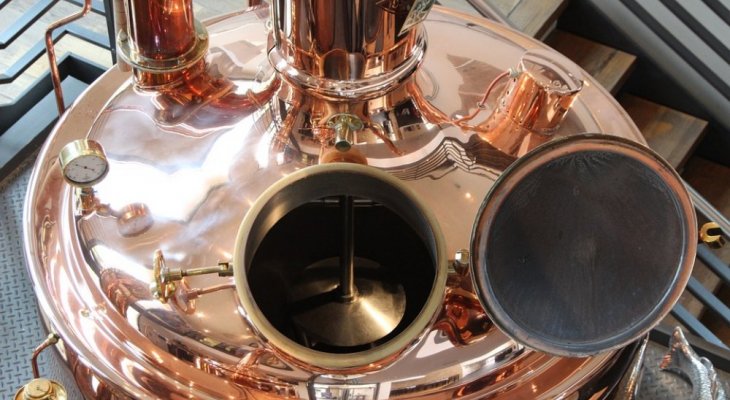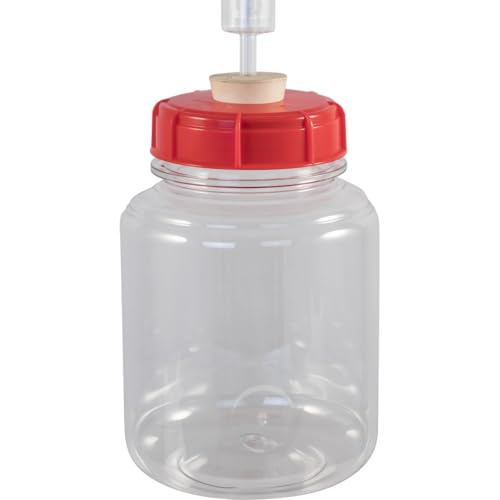3 Dirt Cheap Fermenter Buckets » (Less Than 70$) All You Need

One if not the most important aspect of beer brewing is the fermentation process.
A cheap vessel for this purpose is a fermenter bucket.
Fermenter buckets come in a variety of sizes, materials, brands, etc. and it can be a little difficult to figure out which one is best for you, but don’t worry, that’s exactly what this blog post will help you figure out!
In this Blog Post I will go over the following Fermenter Buckets:
- Brewmaster Brewcraft Homebrew Primary Fermenter With Plastic Lid
- Fermonster 7 Gallon Wide Mouth Plastic Fermenter With Spigot, Stopper & Airlock
- Big Mouth Bubbler EVO 6.5 Gallon Glass Carboy Fermenter
My Favorite Fermenter Bucket
- Fermonster 7 Gallon Wide Mouth PET Fermenter with Spigot
- Built-in 5-gallon, 6-gallon and 7-gallon markers
- Spigot eliminates the need to siphon
Last update on 2026-01-23 / Affiliate links / Images from Amazon Product Advertising API
Read on as I go into further detail on each of the above-listed buckets and display their various properties to help you find the right Fermenter Bucket for you!
Read Also: What Is The Easiest Type Of Beer To Brew?
2 Typical Types of Fermenters For Homebrewing
Before we get into the actual fermenters let’s talk a bit about the difference between plastic bucket fermenters and glass carboy fermenters.
Plastic Bucket Fermenter
First up we have the plastic bucket fermenter. This type of fermenter is the most commonly used among homebrewers.
This is largely due to its low weight, low price and its ability to extremely well.
The wide opening of the bucket also makes it easy for you to clean it before and after use, where a carboy is a bit harder due to its narrow neck.
Disadvantages of Plastic Bucket Fermenters
There are a bunch of disadvantages using plastic buckets for fermentation, which is why some homebrewers decide to use glass carboys instead.
Here is a quick overview of the disadvantages of plastic bucket fermenters:
- Due to the fact that these buckets are made of plastic, there is a quite strong possibility that it will wear out over time in the form of scratches, small holes or just loss of durability in general. This means that eventually, the bucket will be hard if not impossible to sanitize, and thereby a higher risk of spoiling your beer batches
- As I mentioned, these buckets have a quite large opening, usually fitted with a lid. However, due to the size of the opening, the chance of air slipping inside is quite a bit higher compared to carboy variants. This can lead to oxidation of your beer which will ruin your batch, so make sure that lid is airtight!
- Similar to point one, but worth mentioning that plastic simply just isn’t good overtime. Plastic fermenters may be cheap, but you will need to replace them quite often due to the fact that plastic wears out over time, allowing some air molecules to enter which once again, can lead to a ruined batch.
Glass Carboy Fermenters
The Glass carboy type fermenters are not as popular as the plastic buckets due to their heavier weight and higher price.
However, if you don’t mind the investment and extra weight, this type of fermenter will outlast the plastic bucket variant by quite a bit.
Glass carboys have multiple benefits.
In my opinion, there are 2 main things that make class carboys great for fermentation.
- First up is the fact that glass carboys are completely impermeable to air, pretty much eliminating the risk of oxidation during fermentation.
- Glass carboys give you the ability to actually see what is going on inside the container, making it easier to spot any anomalies and act accordingly.
Another great benefit is that due to the material being glass, it is very easy to clean and get rid of any sediment compared to plastic buckets where it may stick to the sides and bottom of the bucket easier.
Disadvantages of Glass Carboy Fermenters
As mentioned, glass carboys aren’t as popular as plastic bucket fermenters for a few reasons:
- Glass carboys are very heavy compared to plastic bucket fermenters, making it quite difficult to move it around once it is taken in use. Some glass carboy fermenters do come with handles, that makes it a tad easier to move them around, but they are still very heavy, so watch yourself when lifting them!
- Due to the shape of the neck on the glass carboy, cleaning it can be a bit difficult. For this task you might need a special brush made with angles that makes it possible to clean the whole carboy. Other options could be using a cleaning solution, which should be able to get rid of most of the sediment inside. Being made of glass makes it fairly easy to get rid of most sediment, since it doesn’t stick as much to the sides as it would in the plastic fermenters.
- The fact that the glass carboy is clear, makes the risk of exposing your beer to too much light a bit higher.
TIP: Make sure you always store your beer away from any exposure of light, since this can easily ruin your batch.
- Last but not least, the cost of glass carboys are usually at least double the price of plastic fermenters, but sometimes even more expensive. However, glass carboys will last longer if you take care of them, since glass doesn’t deteriorate the same way plastic does.
3 Dirt Cheap Fermenter Buckets (Less Than 70$)
I’ve found some very nice fermenter buckets/carboys great for homebrewing. All these will do the job quite efficiently.
At the end of the list I will reveal the one that works best for me.
I hope you can find this review helpful!
#1 On A Budget Pick
- WHAT'S INCLUDED: With this purchase, you'll receive a 6.5 gallon beer fermenter made from food grade HDPE. This fermentation bucket is...
- DURABLE FOOD-GRADE PLASTIC: This sturdy fermenting bucket is the same reliable option included in many of our kits. Made from...
- LIGHTWEIGHT & EASY TO HANDLE: Lightweight and easy to carry, the FastRack Plastic fermenting bucket is much easier to get rid of...
Last update on 2026-01-23 / Affiliate links / Images from Amazon Product Advertising API
| PROS | CONS |
| Price | Faulty seal |
| Functional |
Homebrew Score: 4 out of 5 stars
It is quite simply a plastic bucket with a fitted lid that can hold up to 6 gallons of beer.
It also comes with a lid grommet that you can fit an airlock into for fermentation.
Other than beer you can also use this fermenter for wine, cider, mead or really any type of fermented beverage.
#2 Top Practicality
- Fermonster 7 Gallon Wide Mouth PET Fermenter with Spigot
- Built-in 5-gallon, 6-gallon and 7-gallon markers
- Spigot eliminates the need to siphon
Last update on 2026-01-23 / Affiliate links / Images from Amazon Product Advertising API
| PROS | CONS |
| Functional | Availability |
| Customer service |
Homebrew Score: 4 out of 5 stars
The big upside of this fermenter is the fact that it is fitted with a spigot, that makes transferring beer very easy, and makes it easy to avoid getting and unwanted residue into your beer.
The lid comes with a matching airlock and a stopper, giving you all the tools you need to ferment beer in 1 single purchase.
#3 Premium Pick
- Precision-Crafted Glass Construction: Built by world-class Polish master glassmakers, the Big Mouth Bubbler EVO 2 features extra-thick,...
- Universal Single-Port Lid with Secure Seal: Includes the new Big Mouth Bubbler Universal Lid, compatible with a #6.5 Rubber Stopper or...
- Improved Design for Clearer Transfers: Taller, narrower body shape reduces liquid loss and makes it easier to transfer clear beer or...
Last update on 2026-01-23 / Affiliate links / Images from Amazon Product Advertising API
| PROS | CONS |
| Quality materials | Price |
| Thick glass | |
| Big opening |
Homebrew Score: 4 out of 5 stars
The last fermenter of this post is a glass carboy fermenter.
This Glass carboy holds up to 6.5 gallons and comes with an airtight silicone lid that makes it easy to open and close with little risk of oxidation.
The vessel is fitted with graduation marks that makes it easy to measure how much liquid is inside.
An overall great purchase that will last very long if you treat it right.
My Personal Choice of Fermenter
In my own experience, I find it a bit hard to choose between either a plastic bucket fermenter or glass carboy fermenter.
I like the aspect of glass carboys, but i’m really not a fan of the heavy weight it comes with.
For those reasons the fermenter I’d go with is most likely the Fermonster Wide Mouth Plastic Fermenter. (Amazon link)
This fermenter comes with everything needed for proper fermentation, and I’m a big fan of spigots in fermenters, since it makes it so easy to transfer beer.
You can really pick any type of fermenter you want, this is simply my own preference, figure out what aspects you like in fermenters, and make a choice that fits your brewing habits!






